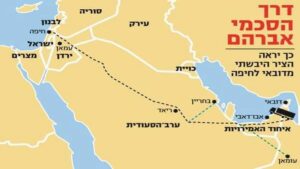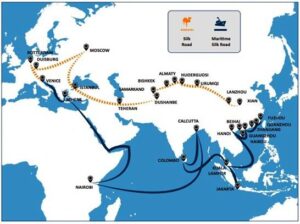By : Prof. Dr. Ayman El Nahrawy
It seems that what we have learned from our Great professor Gamal Hamdan about Egypt and its genius location is now subject to the challenges of time, which brings us every day new developments and challenges based on intense international competitiveness.
Egypt, with its unique geographical location, is the center of the world, its land combines the continents of Africa and Asia, its Mediterranean Sea shores are overlooking the continent of Europe.
Today, new developments are emerging, as each country seeks to achieve its interests, these challenges whether global or regional, are worthy of monitoring and examined by deep analysis, it is a challenge and a response.
The inter-relationship of global trade with Egypt, reached its peak more than 150 years ago, with the opening of Suez Canal, which became the artery of global trade, with annual transit of more than 23 000 ships, constituting up to 20% of the global trade.
Currently, the global arena is drawing new projects, some of which are being implemented and some of which are planned to be implemented. Perhaps the most important is the Chinese Belt and Road Initiative, which aims to open strategic corridors from China to all global markets, with emphasis on Europe and Africa. Thus, it intersects with the circle of interests of Egypt and Suez Canal.
On the other hand, China is seeking to develop and grow the giant logistical corridor of roads and railways from northwest China through the Central Asia, and from there to Turkey and then to Europe, that corridor is already operating with the capacity of ten cargo trains per day carrying goods and containers in both directions, on the other hand China plans to integrate with Russian plans through the Lobito Corridor, the Chennai-Vladivostok Corridor, and the Siberian Railway plans.

New economic corridor !
For its part, the United States presented its vision for transport and logistics in the Middle East region by presenting the idea of the India-Gulf-Europe corridor, which includes two separate corridors; The Eastern Corridor which would connects India to the Arabian Gulf, while the Northern Corridor which would connect the Gulf to Europe via Israel.
Several analysts in Arab Region think that this project represents a new economic Balfour Declaration for Israel, as it immediately received American sponsorship and European support, as the President of the European Commission announced that this project would make the arrival of goods to its destination faster by 40% than the current situation, implicitly, across Suez Canal.
To give momentum to this project, the presidents of the United States, India, France, Germany, Italy, European Union, and two Gulf Arab countries signed a memorandum of understanding to work to begin establishing the new economic corridor.

A plan for a fast train to connect Beit Shean to Eilat on the Red Sea.
For their part, the officials of the Israeli entity expressed their welcome to the project, as the project fully coincides with their deep-rooted ambitions for political and economic hegemony over the region.
Israeli Newspaper Yedioth Ahronoth in a report, revealed a plan for a fast train to connect Beit Shean on the Mediterranean Sea to Eilat on the Red Sea.
The report explicitly stated that the plan will come into effect soon to compete with Egypt Express Train, connecting Ain Sokhna on the Red Sea to New Alamein on the Mediterranean.
The report pointed out that the project budget will come from international agreements and Arab and foreign investments with several countries.
In the same context, the Israeli Minister of Intelligence and Transportation had proposed, before October 7, to revive and develop the historical Hejaz train project, which will link Haifa Port and the Gulf states, passing through Jordan.
Israel will complete the railway lines from Haifa to the land border to Jordan, as Jordan will have to complete the railway lines from Irbid and Al- Mafraq region to the border with Saudi Arabia, to meet the railway lines of the Kingdom, which will extend to the ports of the Arabian Gulf.
The seriousness of this plan becomes clear with the Israeli minister indicating that this will facilitate the cost of the arrival of goods coming from Europe to the Gulf, noting that 25% of Turkish Gulf trade currently passes through the port of Haifa to the Gulf States, passing through Israel and Jordan.
To give legitimacy and acceptance to Israel’s plans, it has been claimed that within the framework of this project, Israel wants to grant the Palestinian side a land port in Al-Jalama area near Jenin, which will be connected to the Israeli railway network, to allow Palestinians to transport their goods to and from the port of Haifa.
As for Jordan, Israel claimed that the project would have significant returns, as Jordan would be the main winner, given that a major part of the arrangements, transportation, and operating area would be in Jordan, which allocated a site in Al- Mafraq area for this purpose, according to Israeli allegations.

Gaza Strip was not far from Israeli plans !
Gaza Strip was not far from Israeli plans, as before the brutal Israeli war on the Gaza Strip on October 2023, Israel promoted a project to create an artificial island off the coast of the Gaza Strip, to establish a seaport and airport to connect Gaza Strip to the world, with security control over it being for the Israeli army.
It is clear that Israeli plans aim to dominate the capabilities of international transport and logistics in the region and grant it control over its economy, by presenting itself as a bridge and base for international multimodal transport between Asia, the Gulf and Europe, through the occupied Palestinian territories.
Today in Egypt, everyone with reason and thought understands why Egypt went to work on the new Suez Canal expansion project, and why Egypt spent billions to develop its road networks, hub ports, railway lines and airports.
Today, the Arab Logistics Corridor establishment with our brothers in Jordan and Iraq will be a base for expanding its scope to include our brothers in the Arabian Gulf and the rest of the Arab countries, as it will be a starting point solving the equation of challenge and response for International Transport and Logistics in the Arab Region in present and future.




